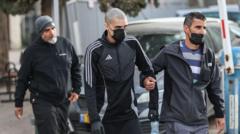After spending nine years in an Israeli prison for a stabbing incident at the age of 13, Ahmed Manasra has been released, yet questions regarding his mental health and the treatment of minors in custody remain. Human rights organizations have highlighted the violations of his rights during his imprisonment, amid broader discontent over prison conditions for Palestinian detainees.
Ahmed Manasra Freed After Nearly a Decade in Israeli Prison, Faces Health Challenges

Ahmed Manasra Freed After Nearly a Decade in Israeli Prison, Faces Health Challenges
The release of Palestinian teen Ahmed Manasra raises concerns over treatment in detention and ongoing issues surrounding Israeli-Palestinian tensions.
Ahmed Manasra, a Palestinian man imprisoned since childhood for a stabbing incident, was released on Wednesday after serving nearly ten years in an Israeli prison. Now 23, Manasra's case has become emblematic of the ongoing violence between Israelis and Palestinians that escalated in 2015. At the time, he was just 13 years old when he and his cousin, Hassan, carried out an attack in a Jewish settlement in East Jerusalem, resulting in injuries to two Israeli individuals before Hassan was shot dead by police.
Human rights advocates have continuously spotlighted Manasra's treatment during his incarceration. Amnesty International condemned the "shocking ill-treatment" he endured, which included nearly two years spent in solitary confinement, leading to serious mental health issues. His lawyer, Khaled Zabarqa, confirmed that Manasra was released after fulfilling his sentence, yet the state of his mental health remains a significant concern.
Manasra's release was preceded by a tumultuous narrative that began on the day of the attack, when he fled the scene and was struck by a car. A disturbing video circulated online, showing him bleeding on the street, taunting from onlookers deepened the outrage in the Arab community, with many assuming he had succumbed to his injuries. However, subsequent reports confirmed him alive and receiving treatment in a hospital.
Throughout his imprisonment, legal efforts for Manasra's early release were repeatedly dismissed because of his conviction for attempted murder. Reports indicate that he developed schizophrenia while incarcerated, and he became a danger to both himself and others at various points.
Since his release, Manasra's family has refrained from speaking to the press as they focus on his recovery. Zabarqa has emphasized the immediate priority to assess Ahmed's health and provide necessary medical treatment.
Human rights organizations, including Amnesty International and the Israeli NGO Adalah, continue to accuse the Israeli government of violating international laws in Manasra's case. They highlight the absence of legal representation during his initial interrogation at the age of 13, and allegations of verbal abuse by security personnel.
In a statement, Adalah stressed an alarming pattern of rights violations experienced by Manasra, including limited contact with family, denial of educational opportunities, and significant medical neglect. Israeli authorities assert that all detainees are managed in accordance with international standards and that investigations are conducted on reported abuse.
For many recently released Palestinian detainees, word has emerged that conditions within Israeli prisons have worsened markedly, particularly following the recent conflict triggered by Hamas's assault on southern Israel. Reports of physical abuse, malnourishment, and insufficient medical care have surfaced from those who have regained freedom.
The situation in Israeli jails remains dire, with a recent incident highlighting the tragic death of 17-year-old Walid Khalid Ahmed, the first Palestinian child to pass away in Israeli custody, reportedly due to severe malnutrition.
As the region grapples with escalating tensions, the stories of detainees bring to light the complex narrative of human rights, health, and the urgent need for systemic reform within prison systems.



















